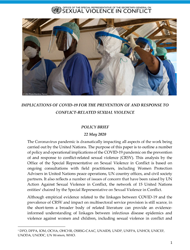 The Coronavirus pandemic is dramatically impacting all aspects of the work being carried out by the United Nations. The purpose of this paper is to outline a number of policy and operational implications of the COVID-19 pandemic on the prevention of and response to conflict-related sexual violence (CRSV). This analysis by the Office of the Special Representative on Sexual Violence in Conflict is based on ongoing consultations with field practitioners, including Women Protection Advisers in United Nations peace operations, UN country offices, and civil society partners. It also reflects a number of issues of concern that have been raised by UN Action Against Sexual Violence in Conflict, the network of 15 United Nations entities chaired by the Special Representative on Sexual Violence in Conflict.
The Coronavirus pandemic is dramatically impacting all aspects of the work being carried out by the United Nations. The purpose of this paper is to outline a number of policy and operational implications of the COVID-19 pandemic on the prevention of and response to conflict-related sexual violence (CRSV). This analysis by the Office of the Special Representative on Sexual Violence in Conflict is based on ongoing consultations with field practitioners, including Women Protection Advisers in United Nations peace operations, UN country offices, and civil society partners. It also reflects a number of issues of concern that have been raised by UN Action Against Sexual Violence in Conflict, the network of 15 United Nations entities chaired by the Special Representative on Sexual Violence in Conflict.
Although empirical evidence related to the linkages between COVID-19 and the prevalence of CRSV and impact on multisectoral service provision is still scarce, in the short-term a broader body of related literature can provide an evidenceinformed understanding of linkages between infectious disease epidemics and violence against women and children, including sexual violence in conflict and post-conflict settings. This analysis is intended to inform policy and programme responses to mitigate the risk of increased sexual violence in conflict and post – conflict settings as part of pandemic preparedness, as well as during and in the aftermath of the pandemic.
Unequal gender relations and patriarchal norms exacerbate crises and are also aggravated at such times, with the potential to further magnify and modify risk and protective factors. Conflict and times of unrest are linked to increased interpersonal violence, particularly against women and children, and pandemics are no exception. The global nature and associated fear and uncertainty of pandemics provide an enabling environment that may exacerbate or spark diverse forms of violence against women and children including sexual violence. Lessons learned from previous epidemics such as Ebola have clearly illustrated the need for a gender responsive and inclusive approach. Therefore, this paper complements and reinforces a number of recent policy briefs of Secretary General that advocate an intersectional gender- and feminist-informed pandemic response.